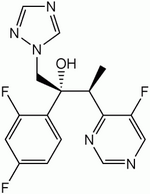Oral antifungals are used to treat both skin and systemic infections. For skin infections, oral antifungals are most commonly used to treat patients who have not responded to topical formulations, although an oral drug is sometimes used from the start, such as in some cases of tinea capitis. Most fungal skin infections are caused by dermatophytes, and terbinafine is the top drug for these pathogens.
Systemic fungal infections most frequently occur in patients who are immunocompromised as a result of HIV infection or transplant immunosuppression, among other reasons. Oral drugs can be effective for milder infections that don't require intravenous treatment. For these infections, fluconazole is the top choice.
Treatment of fungal infections is generally empiric; little identification of the pathogen is done in routine practice. As a result, the top drugs are usually tried first, with second-line agents used as needed. Dosing schemes for oral antifungals vary depending on the conditions for which they're prescribed. Pulse dosing has been suggested for some agents, including terbinafine and itraconazole, especially for treating onychomycosis. In such a regimen the patient receives twice the normal dose every day for a week and then goes off the drug for 3 weeks, after which the cycle is repeated. Some physicians prefer continuous dosing because they believe that compliance is better with a simpler regimen.
Two new drugs in the azole class, posaconazole and ravuconazole, are under development, but Food and Drug Administration approval will probably not occur before late 2004.
All listed drugs can be used in elderly patients with no need for a systematic dosage adjustment, but some of them should not be used in patients with liver or kidney dysfunction.
While the risk to the developing embryo or fetus appears to be low for most oral antifungals, fluconazole 400 mg/day during the first trimester has caused birth defects. Because therapy usually involves prolonged treatment, it is best to avoid all antifungals during the first 12 weeks' gestation if this does not jeopardize the mother's condition. Among the oral antifungals, terbinafine appears to have the lowest potential for harm during pregnancy, but there are no human data.
Nursing mothers should not use most oral antifungals because of the risk of serious toxicity to the infant. Fluconazole is the only oral antifungal considered safe during nursing, but because of the potential for drug accumulation in the nursing infant, experts generally do not recommend antifungal drug therapy during lactation.
The Web site www.doctorfungus.org is an excellent source of information for medical professionals about fungal diseases and treatment.
(Ky.).
COPYRIGHT 2004 International Medical News Group
COPYRIGHT 2004 Gale Group



